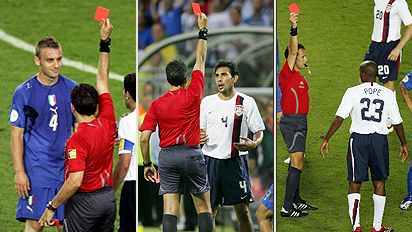I woke up the day after my birthday to a most unwelcome present.
Negative feedback.
I have been using eBAY for well over six years (my first auction was number 268,007,914, my latest 6,638,937,886), and not once had I come close to a disparaging remark. On the contrary, people had gone to absurd lengths to post ridiculously positive feedback -- regardless of whether I truly deserved it or not.
From one seller, I received an "Excellent transaction, good communication and fast payment. Asset to ebay A++++"
More bizarrely, from another, "I LOVE HER!! The nicest, sweetest, best ebayer! And awesome taste! A++"
Then it happened. I received an e-mail from eBAY reassuring me that I was "a valued member of the eBay community" and that my "reputation on eBay is still solid" despite the "recently received negative feedback related to an eBay purchase."
I was stunned.
Considering the cartoonish praise I received for over one hundred transactions, what could I have possibly done wrong? Did I send a severed human head? Did I run over their cat? Did I engage in sexual intercourse with their spouse or significant other?
The answer was depressingly banal: I mistakenly shipped only one CD in a two CD set. My bad.
It is a testament to eBAY that instead of blowing off a small slight to my perceived internet integrity, I did everything in my power to rectify the situation with my disgruntled customer.
eBAY is a brilliantly regulated system of reciprocal altruism.
As the buyer and seller interact through anonymous screen names, the electronic auctioneering website should operate like the hypothetical state of nature without a sovereign and sword to hold people to their contracts. eBAY obviates this prisoner's dilemma of self-interested defection through a system of reputation. Every time an auction and a contract are completed, the buyer and seller leave feedback. Therefore sellers that play by the rules of the game will have a high feedback rating and this will in turn encourage other people to engage in transactions with them. Conversely, sellers with negative feedback will be ostracized as potential buyers refuse to deal with them.
[In
Origins of Virtue, Matt Ridley describes a natural example of this strategy of tit-for-tat. Vampire bats play a cooperation game; each night that bats go out to hunt for blood, numerous bats return without catching anything. A single bat usually obtains more than it needs in a single meal and therefore some altruistic bats will regurgitate blood to a less fortunate bat. It seems that bats have a large enough neocortex to identify which fellow bats are generous and which ones are stingy. Bats are more likely to help out those who have helped them out than those who refuse to help. Therefore, in the context of the prisoner’s dilemma, when they encounter a bat the defects, they simply refuse to play with that bat again. This becomes a form of social ostracism, as bats can refuse to play with those who do not cooperate.]
This is the part of the story where I sound sanctimonious.
By restoring my immaculate reputation and in effect reaffirming the delicate tissue of community trust, I was able to sell a redundant Radiohead ticket for an astonishing 12x face value.
Should I attribute this boon to the financial insanity of fanatical Radiohead fans?
Probably.
But I do not think it would be unfair to give credit to the role cyberkarma played as well.



 "The Uruguayan FA have this week suspended five of their top officials for six months - including one referee who days earlier had been selected for the World Cup Finals.
"The Uruguayan FA have this week suspended five of their top officials for six months - including one referee who days earlier had been selected for the World Cup Finals.





 A couple weekends ago I was doing my regular check on the tapes at the Goodwill on MLK (where I sit on the floor and make it difficult for dudes in sweatpants to check out the Jane Fonda aerobics tapes behind me) when I discovered a Siamese Dream tape. Other previous selections from that bookcase have included a Salt 'n Pepa remix, a pink and black Pat Benatar tape (which is only worth it for "love is a battlefield"--and then only when you are by yourself), and my favorite OMD tape (if you haven't listened to "tesla girl" or "electricity", you need to very soon or my heart will be broken). The Smashing Pumpkins tape would not have been all that significant if I hadn't been recently going through a loud, distorted melodic guitar phase (see: Fugazi, Hum, Team Dresch, noisy Portland bands).
A couple weekends ago I was doing my regular check on the tapes at the Goodwill on MLK (where I sit on the floor and make it difficult for dudes in sweatpants to check out the Jane Fonda aerobics tapes behind me) when I discovered a Siamese Dream tape. Other previous selections from that bookcase have included a Salt 'n Pepa remix, a pink and black Pat Benatar tape (which is only worth it for "love is a battlefield"--and then only when you are by yourself), and my favorite OMD tape (if you haven't listened to "tesla girl" or "electricity", you need to very soon or my heart will be broken). The Smashing Pumpkins tape would not have been all that significant if I hadn't been recently going through a loud, distorted melodic guitar phase (see: Fugazi, Hum, Team Dresch, noisy Portland bands).
 Æon Flux (2005)
Æon Flux (2005) Now that I am reading for pleasure again, I can finally recommend books that aren't exclusively about fin-de-siècle and interwar Europe. I love ontological phenomenology as much as the next graduate student, but sometimes you need a bit of a breather from das Man.
Now that I am reading for pleasure again, I can finally recommend books that aren't exclusively about fin-de-siècle and interwar Europe. I love ontological phenomenology as much as the next graduate student, but sometimes you need a bit of a breather from das Man.